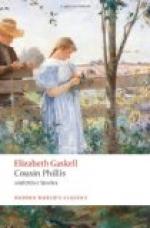When I went over on Easter Day I heard the chapel-gossips complimenting cousin Holman on her daughter’s blooming looks, quite forgetful of their sinister prophecies three months before. And I looked at Phillis, and did not wonder at their words. I had not seen her since the day after Christmas Day. I had left the Hope Farm only a few hours after I had told her the news which had quickened her heart into renewed life and vigour. The remembrance of our conversation in the cow-house was vividly in my mind as I looked at her when her bright healthy appearance was remarked upon. As her eyes met mine our mutual recollections flashed intelligence from one to the other. She turned away, her colour heightening as she did so. She seemed to be shy of me for the first few hours after our meeting, and I felt rather vexed with her for her conscious avoidance of me after my long absence. I had stepped a little out of my usual line in telling her what I did; not that I had received any charge of secrecy, or given even the slightest promise to Holdsworth that I would not repeat his words. But I had an uneasy feeling sometimes when I thought of what I had done in the excitement of seeing Phillis so ill and in so much trouble. I meant to have told Holdsworth when I wrote next to him; but when I had my half-finished letter before me I sate with my pen in my hand hesitating. I had more scruple in revealing what I had found out or guessed at of Phillis’s secret than in repeating to her his spoken words. I did not think I had any right to say out to him what I believed—namely, that she loved him dearly, and had felt his absence even to the injury of her health. Yet to explain what I had done in telling her how he had spoken about her that last night, it would be necessary to give my reasons, so I had settled within myself to leave it alone. As she had told me she should like to hear all the details and fuller particulars and more explicit declarations first from him, so he should have the pleasure of extracting the delicious tender secret from her maidenly lips. I would not betray my guesses, my surmises, my all but certain knowledge of the state of her heart. I had received two letters from him after he had settled to his business; they were full of life and energy; but in each there had been a message to the family at the Hope Farm of more than common regard; and a slight but distinct mention of Phillis herself, showing that she stood single and alone in his memory. These letters I had sent on to the minister, for he was sure to care for them, even supposing he had been unacquainted with their writer, because they were so clever and so picturesquely worded that they brought, as it were, a whiff of foreign atmosphere into his circumscribed life. I used to wonder what was the trade or business in which the minister would not have thriven, mentally I mean, if it had so happened that he had been called into that state. He would have made a capital engineer, that I know; and he




